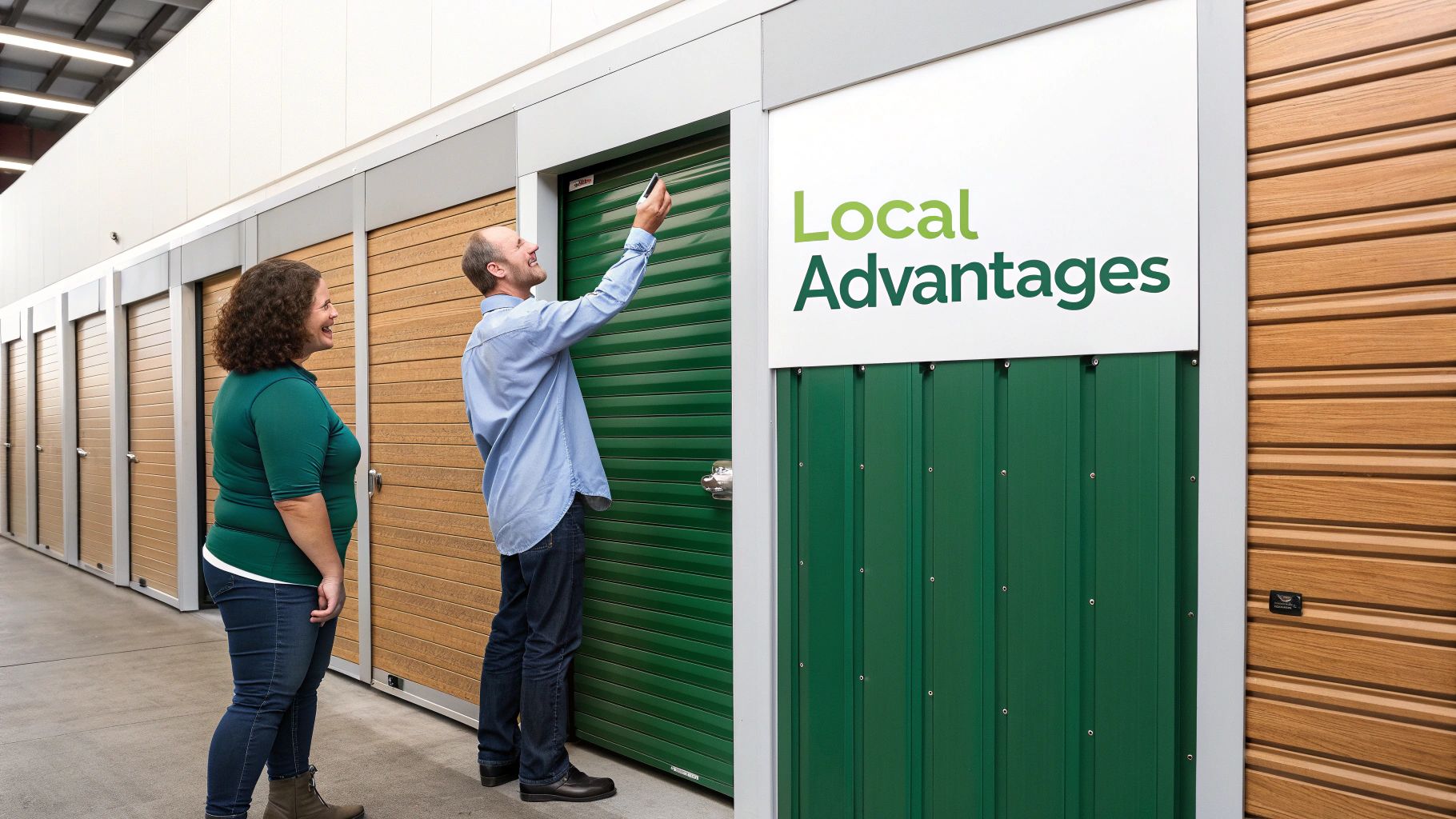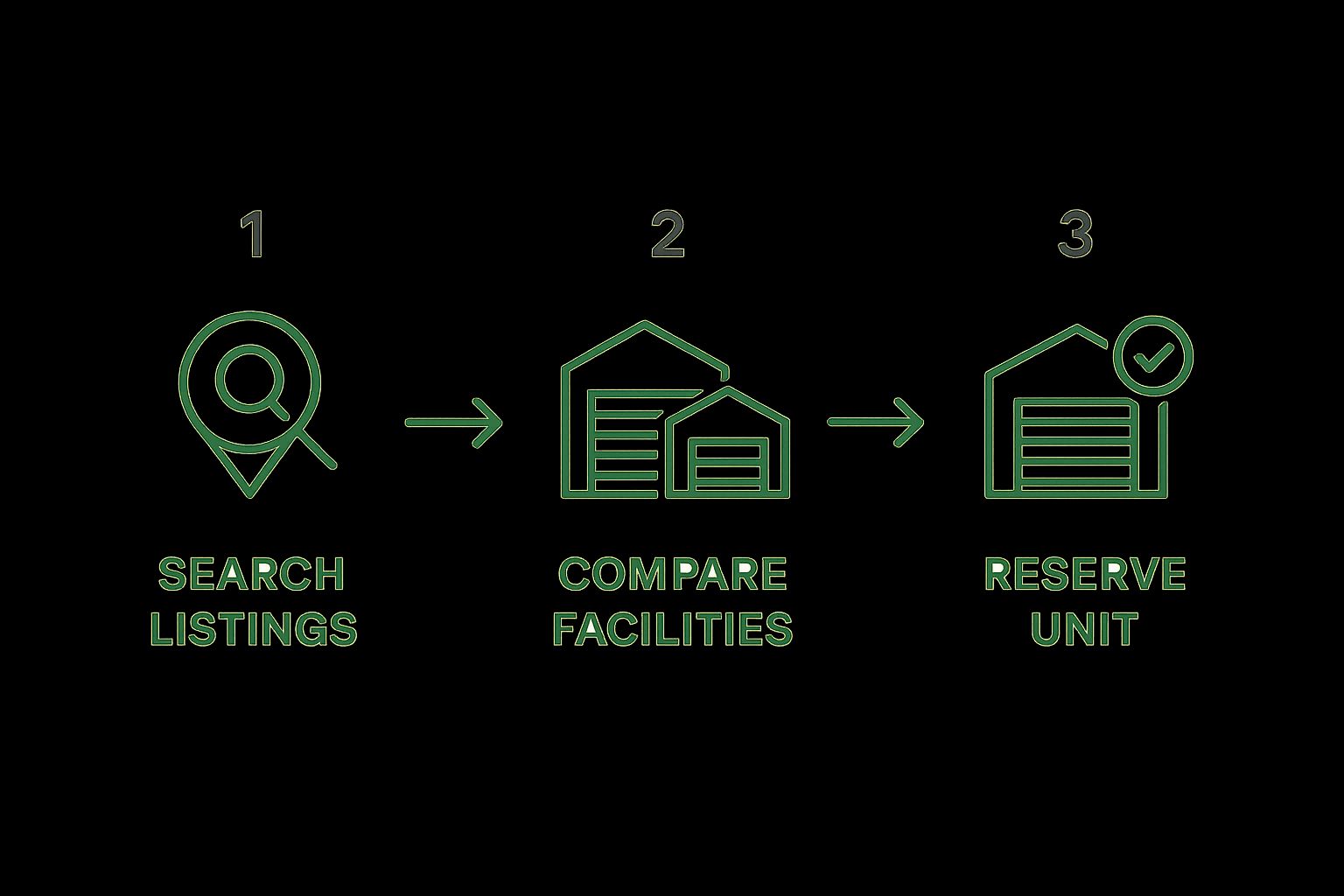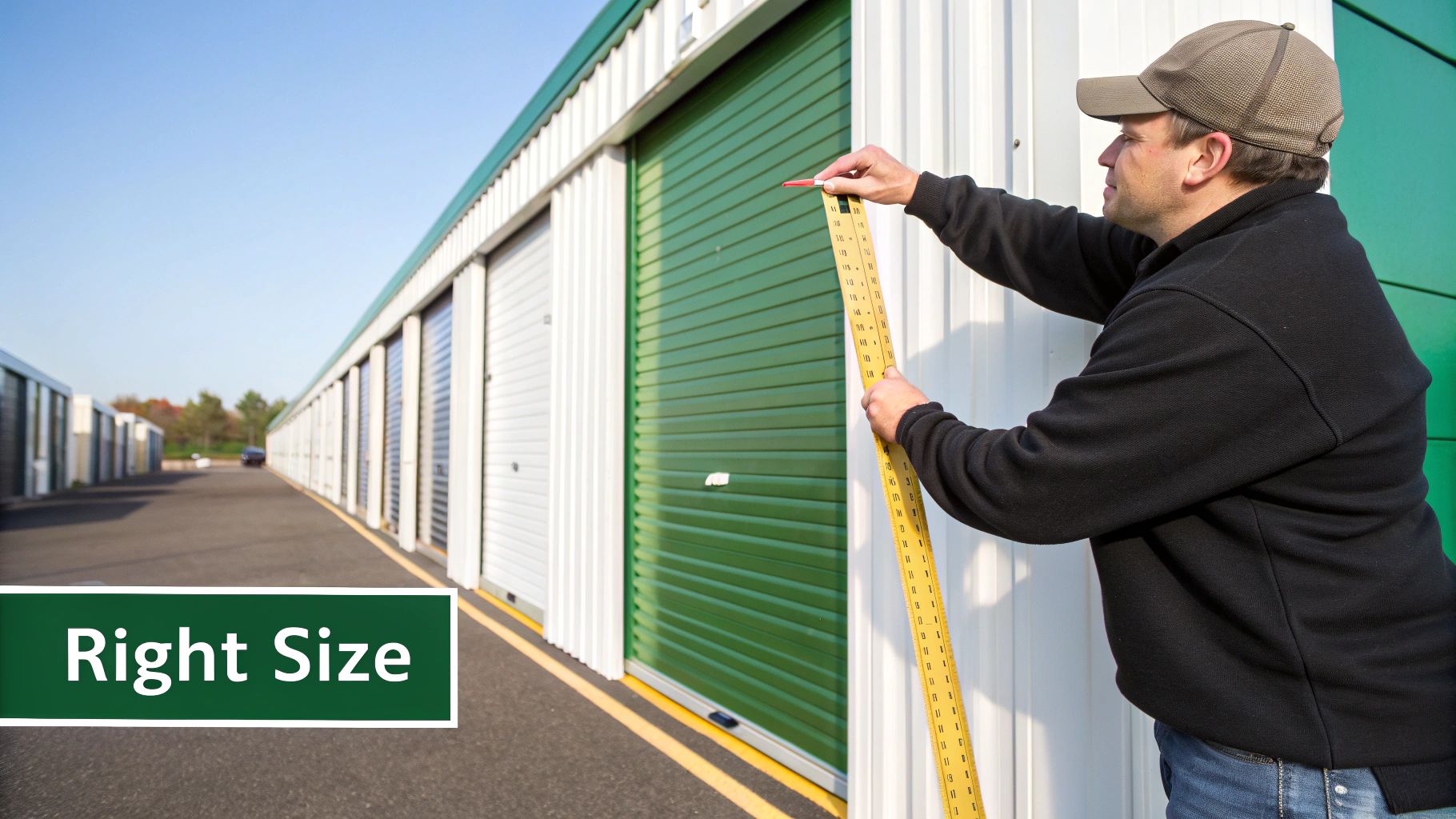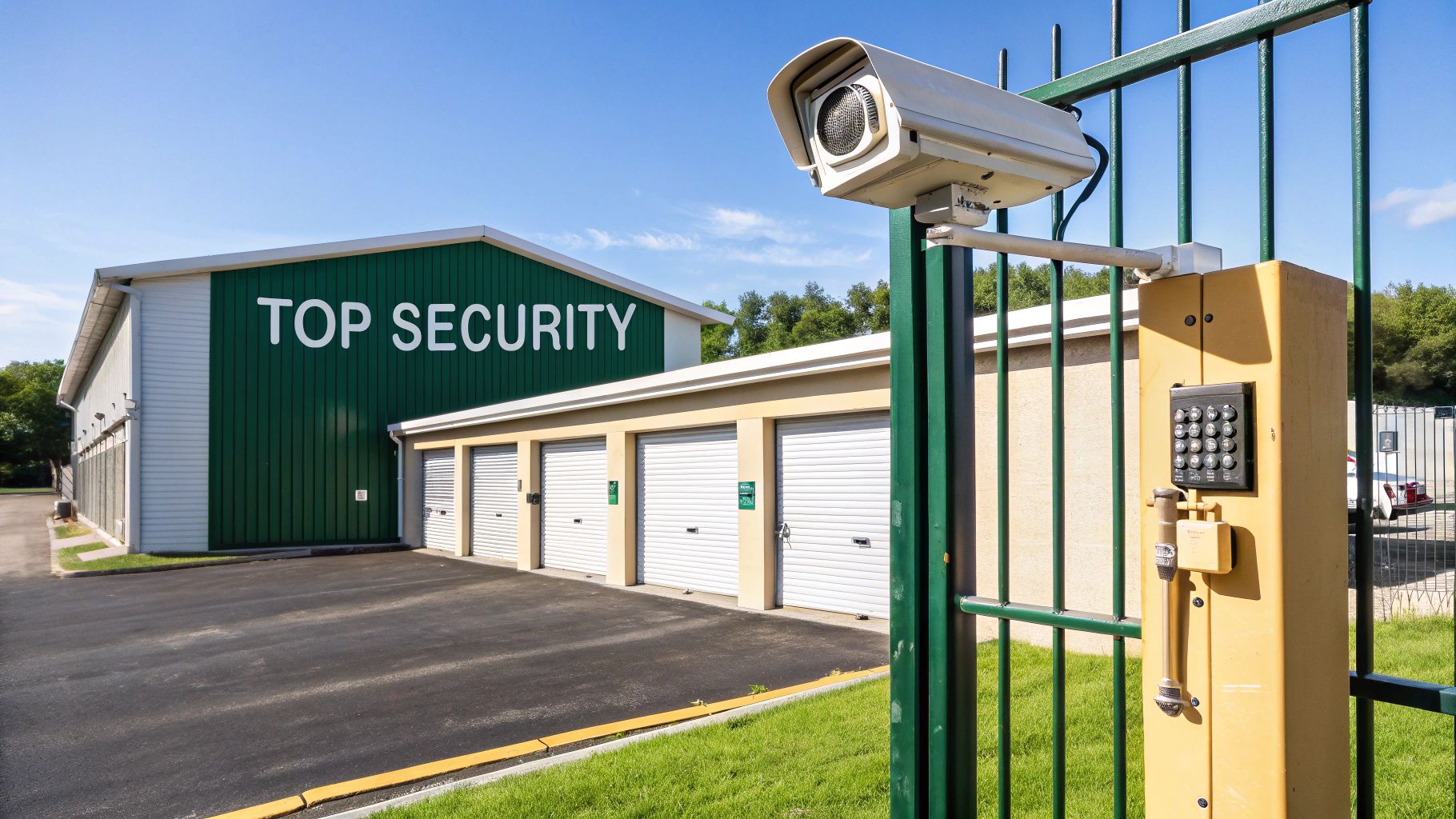Finding Storage Units Near Me in the UK
It feels like everyone is looking for "storage units near me" these days, and it’s easy to see why. Life has a habit of throwing curveballs—a house move, a big renovation project, or even just a long-overdue declutter—that suddenly leave you scrambling for extra space. This guide will help you cut through the noise and find the right storage unit, minus the usual stress.
Why Local Storage Is in Such High Demand
That feeling that everyone needs storage isn't just in your head; it’s a real and growing trend across the UK. Big life changes are usually the main reason. You might be a family trying to clear out clutter before putting your house on the market, or maybe you're a business owner juggling seasonal stock. Whatever the reason, having a secure, accessible space just around the corner has become a lifesaver for so many of us.
The numbers back this up, too. The UK self-storage industry is now worth around £1.2 billion, with thousands of facilities dotted all over the country. A big chunk of this growth comes from the business sector. For example, the boom in online retail has created a huge need for dedicated e-commerce storage solutions.
This image of a modern facility perfectly captures what people expect: a clean, secure, and easy-to-reach place for their belongings.

You can see the simple, effective layout here, with individual roll-up doors giving you private access to your own space. This setup is all about security and convenience—two of the most important things on anyone's checklist when they start their search.
Pinpointing Your Actual Storage Needs
Before you jump online and search for "storage units near me," it’s worth taking a moment to figure out what you actually need. Trust me, it’s all too easy to end up paying for a massive unit you’ll never fill or, worse, trying to cram everything into a space that’s just too small. A bit of planning now will save you a lot of hassle—and money—down the line.
Start by making a quick inventory. What are you actually storing? Is it bulky furniture from a two-bedroom flat, or just a few archive boxes for your business? A university student might only need a small 25 sq ft locker for the summer holidays, while a family moving house will probably need something closer to the size of a single garage.
What Features Are Deal-Breakers for You?
Beyond pure size, think about the practical side of things. How often will you need to get to your stuff? If you're managing business stock, you might need 24/7 access. If it's just long-term storage, standard office hours might be perfectly fine.
You also need to consider if your belongings need a bit of extra protection. A climate-controlled unit is a must for anything sensitive that could be damaged by damp or extreme temperature swings. This includes things like:
- Electronics like computers, TVs, and stereo equipment
- Important documents, photographs, and books
- Wooden or antique furniture that could warp or crack
- Clothing and fabrics that are susceptible to mould
Getting these details sorted first makes the whole process much smoother.

What Size Storage Unit Do You Really Need?
Getting the size right is often the trickiest part. It’s hard to visualise how your belongings will fit into an empty room. This quick reference table should help you match your needs to a standard unit size.
| Unit Size (sq ft) | Roughly Equivalent To | What It Typically Holds |
|---|---|---|
| 25 sq ft | Large walk-in wardrobe | Several boxes, a small mattress, a desk, or the contents of a student flat. |
| 50 sq ft | Large garden shed | Contents of a one-bedroom flat, including some furniture like a sofa and a chest of drawers. |
| 75 sq ft | A Luton-style van | Contents of a two-bedroom flat, including larger appliances and multiple furniture items. |
| 100 sq ft | Single car garage | Contents of a small two-bedroom house, perfect for moves or major renovations. |
| 150+ sq ft | Large single car garage | Furnishings from a three-bedroom house or significant business inventory and equipment. |
This table gives you a great starting point, but every situation is unique. If you're still unsure, it’s always better to have a little too much space than not enough.
For a deeper dive into measuring your items and making the perfect choice, you can learn more about what size storage unit you might need in our detailed guide. A bit of prep work now makes finding the right local storage solution so much easier.
How to Compare Local Storage Facilities Like a Pro
Once you've got a shortlist of local storage options, it's time to dig a little deeper. Choosing the right facility is about more than just finding the cheapest monthly rate. A bit of due diligence now can save you a mountain of headaches down the line.

Think of it this way: you’re not just renting a space; you're entrusting your possessions to someone else. You need to be completely confident they’re in good hands, which means looking at security, potential hidden costs, and the overall quality of the place.
Look Beyond the Price Tag
That tempting monthly fee you see advertised is often just the tip of the iceberg. Many facilities have extra costs that only pop up when you're about to sign, so it’s crucial to get the full picture from the start.
Make sure you ask about these common add-ons:
- Mandatory Insurance: Almost every facility will insist on insurance. First, check if your existing home contents policy covers items in storage. If not, you'll likely need to purchase a policy directly from them.
- Security Deposits: Is there a refundable deposit you need to pay upfront?
- Admin Fees: Some places charge a one-off fee just for setting up your account.
- Padlocks: Don't assume a lock is provided. Often, you'll need to buy a specific high-security lock from the facility itself.
These seemingly small charges can really add up, so always ask for a complete cost breakdown before you commit to anything.
Prioritise Genuine Security Features
Security should be right at the top of your list, but not all security measures are created equal. You need to focus on what actually makes a difference.
A truly secure facility will have a solid combination of high-quality CCTV covering all key areas, secure electronic gate access, and—this is a big one—staff present on-site during opening hours. Just having people around is one of the best deterrents there is.
A facility's approach to security says a lot about its overall standards. If the gates look a bit rickety or the cameras seem ancient, it could be a red flag for wider neglect. Always trust your gut when you visit.
Read Reviews and Visit in Person
Online reviews are a goldmine of information, but you need to learn how to read between the lines. Don’t get swayed by a single five-star rave or a one-star rant. Instead, look for consistent themes. Are multiple people mentioning how clean the site is, how helpful the staff are, or, conversely, complaining about billing problems? That’s what you want to pay attention to.
Of course, nothing beats seeing the place with your own eyes. Schedule visits to your top two or three choices. Take a look around. Are the corridors well-lit? Does it smell clean and dry? Are the units properly sealed? This is your chance to get a real feel for how the place is run and whether you’d be happy leaving your things there.
The UK self-storage sector is booming, with a total floorspace of 64.3 million square feet and an average occupancy of 75.1%. While this growth gives you more choice than ever, it also makes it vital to pick a professional and well-managed facility. You can read more about the trends in the UK self-storage market on cushmanwakefield.com.
UK Regional Storage Prices and Availability: What to Expect
Where you are in the UK makes a huge difference to how much you’ll pay for a storage unit and how easy it is to find one. It all boils down to supply and demand. Trying to find a unit in London or the South East? You’ll likely face more competition and higher prices compared to someone looking in the Midlands or the North West. This is all tied to local house prices, how densely populated an area is, and business activity.

Getting a feel for these regional trends from the start helps you set realistic expectations. For example, in a busy city, you’ll probably need to book well in advance to get the space you want, especially during peak moving season in the summer. In a quieter area, you might find you have more choice, better availability, and maybe even a bit of wiggle room on the price.
How Regional Growth Affects Your Search
The self-storage industry is definitely growing, but it’s not happening evenly across the country. Recent industry reports point to the South East and North West as hotspots for new facilities, with storage space set to grow by 6.3% and 4.9%, respectively. London, on the other hand, is seeing much slower growth at around 1.2%, which isn't surprising given how expensive land and property are there. You can get more insight into these self-storage trends on storeganise.com.
So, what does this mean for you? It gives you an edge. If you're hitting a wall finding affordable storage units near me in a major city, it’s often worth looking at facilities in nearby commuter towns. You could end up saving a surprising amount of money. It’s a classic trade-off between convenience and cost, but one that often pays off.
Knowing the market realities in your area is key. Don't just settle for the closest option out of habit. Broaden your search radius by just a few miles and you might find much better value.
This is especially true if you only need storage for a short period, like during a house move or renovation. Our guide on finding temporary storage near me has more specific tips for this exact situation, helping you strike the right balance between location and price for short-term needs. A little extra research here can lead to a much smarter, more cost-effective decision.
Smart Ways to Pack and Organise Your Storage Unit
So, you’ve found the perfect local storage unit. Excellent. But the job's only half done. How you pack and organise everything is just as important as the unit you choose. A bit of planning now will save you a world of headaches later, especially when you need to find something specific without unpacking the whole lot.
The real work starts well before you get to the facility. My number one tip? Use good quality, uniform-sized boxes. It might seem like a small thing, but stacking a neat wall of identical boxes is so much safer and more stable than a wobbly Jenga tower of assorted supermarket cast-offs.
Create an Aisle for Easy Access
The single biggest mistake I see people make is cramming their unit full from back to front. Don't do it. Always, always leave a walkway down the middle. Even a narrow aisle is a game-changer, letting you get to those boxes at the very back without having to pull everything else out first.
It's not just about access, either—it's about airflow. You'll want to leave a small gap between your stacks and the unit's walls. This helps air circulate, which is crucial for preventing any mustiness or moisture build-up over time. For a full breakdown of the best packing techniques, our guide on how to pack your storage unit has you covered.
Pro Tip: Label every single box. And not just on top. Make sure you write on at least two sides, including one that will face your aisle. When you're searching for your winter jumpers in a hurry, future you will be very grateful.
Think strategically about what goes where. If you know you'll need your camping gear in a few months, keep it near the door. Items you won't touch for years can go right to the back. When it comes to textiles, knowing the best way to store clothes is key to keeping them fresh and free from damage.
Know What You Can't Store
Finally, a quick but critical word on what to leave at home. Every storage facility has strict rules for safety, and they all ban certain items. It’s non-negotiable. This always includes:
- Flammable or hazardous materials: Think petrol, paints, cleaning solvents, or gas canisters.
- Perishables: No food of any kind. It's an open invitation for pests.
- Living things: This goes for plants as well as pets!
Always double-check the facility's specific list of prohibited items before you start packing. It'll save you a lot of hassle on moving day.
Your Storage Questions, Answered
Once you've narrowed down your options, a few final questions usually pop up. It’s completely normal. Getting these sorted before you sign anything is the key to a stress-free storage experience. Let's run through some of the most common queries we hear from people looking for local storage.
We'll cover the big ones – like what the deal is with insurance and what you absolutely cannot put in your unit. Knowing this stuff upfront saves a world of headaches later on.
What’s the Deal with Insurance? Do I Really Need It?
Yes, you do. Pretty much every storage facility in the UK will insist that your belongings are insured. It’s a non-negotiable part of the contract. Most places will offer their own insurance policy, which is handy as you can just roll it into your monthly payment.
But hold on a minute. Before you tick that box, give your home contents insurance provider a quick call. Some policies will actually cover your items even when they're in an off-site storage unit. If yours does, you could save a bit of cash. If not, you’ll need to get cover from somewhere—either the facility or a specialist insurer—that protects the full value of your goods against things like fire, theft, and water damage.
A word of advice from experience: The responsibility for having the right level of insurance is always on you. Don’t be tempted to under-insure your belongings to save a few quid; it's a false economy that could be devastating if something went wrong.
Is There Anything I’m Banned from Storing?
Absolutely. Every facility has a strict list of prohibited items, and it's there for everyone's safety. Ignoring these rules is a serious breach of your agreement and can get your contract terminated on the spot.
As a general rule, you can never store:
- Flammable or explosive items – think petrol, gas canisters, fireworks, or even paint thinner.
- Food of any kind – perishables attract pests and create a real mess.
- Living things – this one’s a no-brainer. No plants, no animals.
- Illegal or stolen goods – this includes firearms and anything you shouldn't have in the first place.
It's always best practice to ask the manager for their specific list of banned items before you even think about packing.
Can I Actually Run My Business from a Storage Unit?
This is a great question, and the answer is a classic "it depends". Many facilities are now very business-friendly, especially for e-commerce sellers needing a place for stock, or tradespeople storing tools and equipment. Some even offer extras like Wi-Fi and mail handling to make your life easier.
What you can't do is set up a customer-facing shop, a workshop with noisy machinery, or use it as your permanent office. This all comes down to their insurance, health and safety rules, and local council regulations. The best thing to do is just have an honest chat with the site manager. Tell them exactly what you need to do, and they'll tell you what's possible within their rules.
For a clean, secure, and straightforward storage solution in the Exeter area, the experienced team at MG Self Storage has you covered. Find the right unit for your home or business and see how we can help today.




